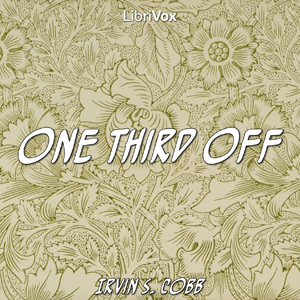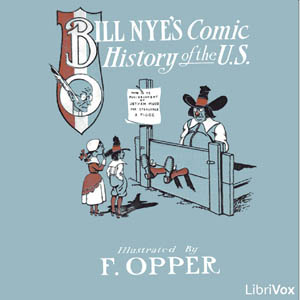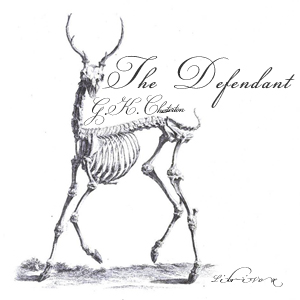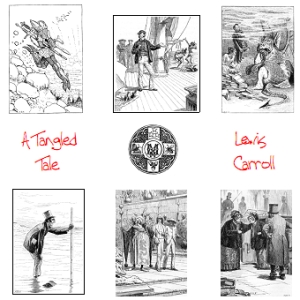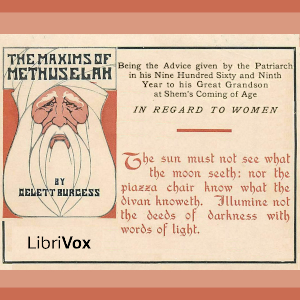Irvin Shrewsbury Cobb (June 23, 1876–March 11, 1944) was an American author, humorist, and columnist who lived in New York and wrote over 60 books and 300 short stories. Cobb has been described as "having a round shape, bushy eyebrows, full lips, and a triple chin. He always had a cigar in his mouth." This book is a hilarious account of Cobb's attempts at weight-loss. (Summary from wikipedia)
11 episodes
These eleven files are miscellaneous short essays or stories from G.K. Chesterton. They were chosen for not only their brevity but also for being shining exemplars of Chesterton's wit and whimsy. A fun but powerful introduction into the mind of the man that is G.K. Chesterton. (Summary by GK Cleveland)
9 episodes
Gilbert Keith Chesterton was an influential English writer of the early 20th century. His prolific and diverse output included journalism, philosophy, poetry, biography, Christian apologetics, fantasy, and detective fiction. Chesterton has been called the "prince of paradox." He wrote in an off-hand, whimsical prose studded with startling formulations. Chesterton wrote about 4000 essays on various subjects, and "Alarms and Discursions is one of his collections. (Summary adapted from Wikipedia by Karen Merline.)
13 episodes
This text takes the reader on a comical journey from the time of the first European settlement through the Civil War. The author's caustic wit is evident throughout the book in his numerous sarcastic and humorous remarks. The reader will enjoy a "different" type of history book based on facts, yet caustically embellished for entertainment purposes.
(Summary by Allyson Hester)
16 episodes
A collection of reprinted articles on a wide-range of subjects, all in the unique style of G. K. Chesterton. Using wit, paradox, and good humor he “defends” a series of seeming harmless things that need no defense, and in so doing he exposes many of the broken assumptions and dogmatic notions of secular humanism and other trends of his age and of ours. (Summary by Ray Clare)
18 episodes
Lewis Carroll (1832 - 1896) is best known for 'Alice's Adventures in Wonderland'. It is less widely known that he worked as a lecturer for mathematics at Christ Church college, Oxford for 27 years. 'A tangled tale' merges his two talents as storyteller and mathematician. It consists of 10 short humorous stories which present one or more mathematical problems. The 10 'knots' as they are called, were first published in 'The Monthly Packet' magazine between April 1880 and March 1885, where readers were invited to solve the problems, and the solution was discussed in a later issue. (Summary by Availle)
20 episodes
"...Showing Curious ways in which the English Language may be made to convey Ideas or obscure them." A collection of unintentionally humorous uses of the English language. Sections of the work: How she is wrote by the Inaccurate, By Advertisers and on Sign-boards, For Epitaphs, By Correspondents, By the Effusive, How she can be oddly wrote, and By the Untutored. (Summary by TriciaG)
4 episodes
Seventeen goofy stories and essays by Canadian humourist Stephen Leacock. "Professor Leacock has made more people laugh with the written word than any other living author. One may say he is one of the greatest jesters, the greatest humorist of the age." – A. P. Herbert (Introduction by TriciaG & Wikipedia)
17 episodes
This is a collection of short humorous works first published before 1923. (Summary by BellonaTimes)
15 episodes
Bill Nye was a famous American humor columnist in the middle 1800's. He said "We can never be a nation of snobs so long as we are willing to poke fun at ourselves." And he did exactly that in hundreds of newspaper columns that were later collected into books. This is a selection of just 35 of the most humorous, wry and downright funny cogitations of his, written of course in the somewhat convoluted style common in the 19th century which just adds to their flavor in my opinion. The selection process was rigorous: only those that made me laugh, giggle or snort are included. (Summary by phil Chenevert)
35 episodes
A collection of amusing essays satirizing serious consideration of topics including natural history, social etiquette, or indeed, civilized behavior (especially of the upper classes). (Summary by Arnold Banner)
22 episodes
We join our thoughtful author on a dreamy stroll at dusk through the English countryside, and listen to his nonchalant, slightly scattered musings on the human condition...everything from loafing about and old book collecting, to heavier topics like what is more valuable: memory or forgetfulness and can we connect back to nature, or is it too late to do so. All these ponderings, and more, are explored within.
Published in 1898, this collection of essays is Kenneth Grahame's first complied work. His wry and witty humor, which later would be celebrated in his famous novel, The Wind in the Willows, shines through here. - Summary by Mary Kay.
18 episodes
A humorous guide for ladies and gentlemen in all social crises. (Summary by MaryAnn)
9 episodes
Famed American humorist Washington Irving published a series of short stories telling of his adventures traveling from America to England. This volume contains some of his observations about that trip, including his impressions of the English countryside, the differences between the wealthy and the poor, rural customs, and other aspects of British culture. During a visit to the library located in the depths of Westminster Abbey, Irving muses on the issue of why some examples of English literature stand the test of time, while others are lost to history. The collection concludes with Irving's memories of his visit to Stratford-on-Avon, the home of William Shakespeare, and the nearby communities that influenced some of Shakespeare's work. ( Greg Giordano)
6 episodes

This collection of the 258 known, publicly-printed interviews of Mark Twain (Samuel Langhorne Clemens) was compiled by Gary Scharnhorst and published by the University of Alabama Press. The interviews are in the Public Domain, and our thanks go to Gary Scharnhorst and the University of Alabama for making them available for this Public Domain audio recording. They were compiled in the University of Alabama Press book entitled "Mark Twain: The Complete Interviews" and are arranged, chronologically, from Twain's first authenticated interview in 1871, to his last interview in 1910. Here's how Professor Scharnhorst has characterized the interviews:
Interviews 1-20 The Growth of Mark Twain's Early Reputation, 1871-1884
Interviews 21-39 The "Twins of Genius" Tour, 1884-1885
Interviews 40-59 The Best and Worst of Times, 1886-1895
Interviews 60-81 Across North America, 1895
Interviews 82-120 Across Australia, Asia, and Africa, 1895-1896
Interviews 121-151 "Ambassador at Large" and Man of Letters, 1897-1901
Interviews 152-170 Last Visit to Mississippi, 1902
Interviews 171-195 At Large, 1902-1906
Interviews 196-220 "Dean of Humorists," 1906-1907
Interviews 221-235 Visit to Oxford, 1907
Interviews 236-258 The Long Goodbye, 1907-1910
Extensive analysis (for instance how other publications interpreted identical interview sessions), notes, appendix and index are included in the printed work. - Summary by John Greenman
256 episodes

I could not let these random notes of a delightful experience go forth into the world without expressing in some way my deep appreciation of the valued services rendered me in my ten years of platform work by my friends of the Lyceum Bureaus. In office and in the field they have labored strenuously, often affectionately, and always loyally, on my behalf. But for their interest some of the most cherished experiences of my life would have been beyond my reach. If sometimes in their zeal to keep me busy they have booked me in Winnipeg on Monday night, in New Orleans on Tuesday night, with little side-trips to San Diego, California, and Presque Isle, Maine, on Wednesday and Thursday, not to mention grand finales at Omaha and Key West on Friday and Saturday, I view that sequence rather as a tribute to my agility than as a matter to be unduly captious about. It is a manifestation of a confidence in my powers to overcome the limitations of time and space that I think upon with an expanding head, if not with a swelling heart, and whether this required annihilation of distance has been wholly agreeable or not it has enabled me to see more of my own country than I otherwise could have
seen, and to that extent, I hope, has made a better American of me. - Summary from the author's preface
16 episodes
Arthur Bingham Walkley was an exceedingly popular critic, working as a drama critic at The Times alone for no less than 26 years, and writing for several other newspapers and privately besides that. This book of pastiches was completed after he already had more than two decades of work as a theatre critic under his belt, and it draws some brilliant characterisations. Among the literary and historical figures found in the different pastiches are such illustrious figures as Aristotle and Shakespeare, but also more modern phenomena as movies are discussed, along with politicians and other famous persons of the time. - Summary by Carolin
55 episodes
Being the Advice given by the Patriarch in his Nine Hundred Sixty and Ninth Year to his Great Grandson at Shem's Coming of Age, in Regard to Women.The following is, so far as I know, the only authentic rendering into the English language of the three hundred and thirty parables attributed to Methuselah. . . . Of its origin, the book, although freely rendered into the idiom of the hour, still bears intrinsic evidence of having been compiled by one who had had extraordinary experience with women. The amorous expert will not find it hard to believe that 969 years would be none too short a time for any one man to have accumulated such a profound lore. Indeed, women tell us that the present span of life is entirely too brief for any ordinary man to obtain the slightest comprehension of the extreme complexity of feminine psychology. (Summary from the introduction)
12 episodes
A. A. Milne (18 January 1882 – 31 January 1956) was an English author, best known for his books about the teddy bear Winnie-the-Pooh and for various poems. 'If I May' is a collection of short essays on desultory subjects that first appeared in The Sphere, The Outlook, The Daily News, The Sunday Express (London) and Vanity Fair (New York). These essays display Milne's vivid imagination and literary ability to elaborate on almost any subject in an engaging manner. Milne's literary style and humor - often self deprecatory - endear him to modern readers as well - Summary by Wikipedia, S K
41 episodes
This collection of the 195 known, publicly-printed speeches of Mark Twain (Samuel Langhorne Clemens) was compiled by Paul Fatout and published by the University of Iowa Press. The speeches are in the Public Domain, and our thanks go to the University of Iowa for making them available for this Public Domain audio recording. They were compiled in the University of Iowa Press book entitled "Mark Twain Speaking" and are arranged, chronologically, from Twain's first authenticated public speech in 1864, to his last speech, exactly 7 months before he died. Extensive analysis (for instance how other publications interpreted identical interview sessions), notes, appendix and index are included in the printed work.
- Summary by John Greenman
128 episodes
This is a diverse collection of essays by English writer Max Beerbohm, whose circle included such notables as Oscar Wilde, George Bernard Shaw, Ezra Pound, and Somerset Maugham. Much of Beerbohm's work was humorous, including parodies of various aspects of the upper class life into which he was born.
Some of these pieces are humorous, some philosophical, and some even sad. They include, for instance: a frankly self-critical piece on the pomposity and self-importance of his early literary ambitions; a half-eager, half-repining essay on a missing and uncompleted portrait of the great German writer, Johann Wolfgang von Goethe; and a funny, but politically critical essay on "the servant question." (Summary by Kirsten Wever.)
20 episodes

Julio Camba Andreu (1884 - 1962) fue un escritor y periodista español. Nació en una familia gallega de clase media. A los trece años, se escapa de casa y embarca como polizón en un barco a Argentina. En Buenos Aires se introduce en los círculos anarquistas y comienza a redactar proclamas y panfletos. A consecuencia de ello, en 1902 es expulsado de Argentina, junto a otros anarquistas extranjeros. De regreso en España en 1903, comienza a colaborar en El Diario de Pontevedra, pero rápidamente se instala en Madrid, en donde escribe sucesivamente en El Porvenir del Obrero, en su propio propio periódico El Rebelde, en El País y en España Nueva.
Su vida como corresponsal en el extranjero comienza en 1908, cuando es enviado a Turquía por La Correspondencia de España. El Mundo le envió a sus corresponsalías en París, Londres y Berlín. En 1912 empieza a escribir en La Tribuna y desde 1913 empieza a colaborar con el diario monárquico ABC, donde escribió durante muchos años, con una interrupción escribiendo en El Sol. Sigue girando por varias corresponsalías. Durante la Guerra Civil sus crónicas (en las que expresaba sus simpatías por el bando franquista), se publican en el ABC de Sevilla. Mantuvo otra colaboración de dos años, entre 1951 y 1953, con Arriba. En este periódico comienza con la reelaboración de crónicas y artículos antiguos que se siguen publicando en ABC y La Vanguardia. En 1949 fija su residencia en el Hotel Palace de Madrid, hasta su muerte en 1962.
La rana viajera cuenta la vuelta de la rana Camba a España después de sus estancias como corresponsal durante ocho años en capitales como Londres, Berlin, Roma o Nueva York, es decir, cuando la rana torna a la charca. Ya no es la misma rana de antes de partir, es menos ingenua, algo más instruida, y hasta está provista de gafas. ¿Qué efecto le producirán las otras ranas a esta rana que está transformada de tal modo? ¿Cómo encontrará su charca la rana viajera, después de una ausencia de tantos años?
Camba utiliza España como punto de referencia por ser español y no porque España le parezca la medida ideal de todos los valores. Y en su opinión, no sólo resultará que España no puede ser un modelo para las otras gentes, sino que no sirve apenas para los mismos españoles. La rana encontrará su charca muy poco confortable. - Summary by Basquetteur y la introducción del libro
84 episodes
English as She is Spoke is a 19th century Portuguese-to-English phrasebook that has become a classic of absurdist humor, owing chiefly to the apparent fact that its writer had absolutely no knowledge of English. It is thought that for utterly obscure reasons its unknown author, Pedro Carolino, used a dictionary to translate Portuguese words to French, then a second dictionary to convert French to English, producing an incoherent but hilarious result. Mark Twain said of this book, "Nobody can add to the absurdity of this book, nobody can imitate it successfully, nobody can hope to produce its fellow; it is perfect." - Summary by J A Carter
4 episodes
A front-line view of life in the trenches of the Western Front in the early part of 1914-1915. Told by Lieutenant (later Captain) Bruce Bairnsfather, cartoonist, whose Alf, Bert, and Old Bill were forerunners to Bill Mauldin and his Willie and Joe in World War II. This volume traces Bairnsfather's service as a machine gun officer from its inception until he was removed from the battlefield by the intense shelling during the Second Battle of Ypres (April 1915). It is told with a wry, ironic, grim humor often possessed by those who have endured shells, bullets, floods, mud, bully beef, maconochie, and a surfeit of plum and apple jam. His participation in the unofficial Christmas Truce of 1914 (for which he was investigated in view of a court-martial) is documented as well as the horrors of war at close quarters. (Summary by Dr. P. Gould)
32 episodes
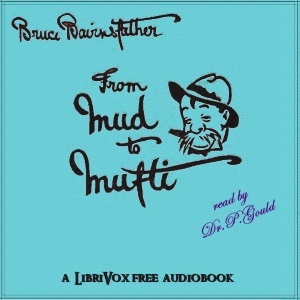
This second volume of memories from the Great War (WWI) by the celebrated war cartoonist and social observer, begins with Bairnsfather's recuperation from injuries suffered in the Second Battle of Ypres and ends with the Armistice.
In this phase of his war activity, Bairnsfather is repeatedly hampered by his inability to fully recovery from his war wounds, and is eventually removed from combat service. This perceived disaster for his war career actually was a lucky break, because he was then attached to British Intelligence as an authorized war cartoonist--perhaps the only one of the war. In this capacity, he was ordered to visit the various allied fronts, observing and drawing the aspects of the war in those locations that impressed themselves upon his mind and memory.
His perspective, visiting and witnessing first hand the interactions between the various allied armies, remains unique, and his inimitable style provide a valuable as well as entertaining glimpse of allied operations in the final stages of the war. ( DrPGould)
38 episodes
Until recently, this work has been considered the "go-to" bio of Mark Twain. Albert Bigelow Paine (July 10, 1861 – April 9, 1937) was an American author and biographer best known for his work with Mark Twain. This recording of Paine's exhaustive biography covers Twain's personal and literary life in detail, heretofore unapproached. - Summary by John Greenman and Wikipedia
105 episodes
It is refreshing to find an unworked field all ready for harvesting.
While the wit of men, as a subject for admiration and discussion, is now threadbare, the wit of women has been almost utterly ignored and unrecognized.
With the joy and honest pride of a discoverer, I present the results of a summer's gleaning.
And I feel a cheerful and Colonel Sellers-y confidence in the success of the book, for every woman will want to own it, as a matter of pride and interest, and many men will buy it just to see what women think they can do in this line. In fact, I expect a call for a second volume!
Kate Sanborn.
Hanover, N.H., August, 1885.
12 episodes
Thirty four whimsical, tongue-in-cheek, and entertaining essays about not much in particular, published in 1902, by one of the most popular writers of the late nineteenth and early twentieth centuries. The American Gelett Burgess (1866-1951) was an artist, art critic, poet, author, and humorist. Nonsense verse (none in this collection) was a specialty. - Summary by David Wales
18 episodes
Ralph Keeler failed as a novelist, but this autobiography reflects a life well-lived with humor and adventure. Keeler was in the same literary circle as satirist Bret Harte, novelist Charles Warren Stoddard, editor Thomas Bailey Aldrich, and essayist William Dean Howells. He so impressed Mark Twain that Twain wrote an essay about him called "Ralph Keeler". In 1873, on his way to Cuba, he reportedly was thrown overboard by a Spanish loyalist who objected to his backing of the revolutionary, anti-Spanish movement. - Summary by John Greenman
25 episodes
A compendium of Oscar Wilde's wit, including some of his most famous epigrams as well as unpublished quotations supplied by his friends. The book is formatted as a calendar, with one saying for each day of the year, and was edited by Wildean scholar, Stuart Mason (born Christopher Sclater Millard). - Summary by Rob Marland
12 episodes
This collection of Mark Twain travel letters was compiled by Barbara Schmidt for her website, TwainQuotes.com. According to his biographer, Albert Bigelow Paine, when Twain took his family to Europe in June of 1891, he left with the knowledge that the McClure Syndicate and W. M. Laffan of the New York Sun would pay him one thousand dollars each for six travel letters. Twain’s letters eventually appeared in numerous papers including the Chicago Sunday Tribune, Atlanta Constitution, Boston Globe in addition to the New York Sun. Readers of his “The Innocents Abroad” and “A Tramp Abroad” will remember his knack of viewing his discoveries with satirical and ironic twists. - Summary by John Greenman and Barbara Schmidt
6 episodes
Humorous---and insightful---commentary on cats in prose and poetry. - Summary by KevinS
16 episodes
A 1924 collection of essays by the celebrated Canadian humorist, popular in the first half of the twentieth century throughout the English speaking world. - Summary by david wales
11 episodes
